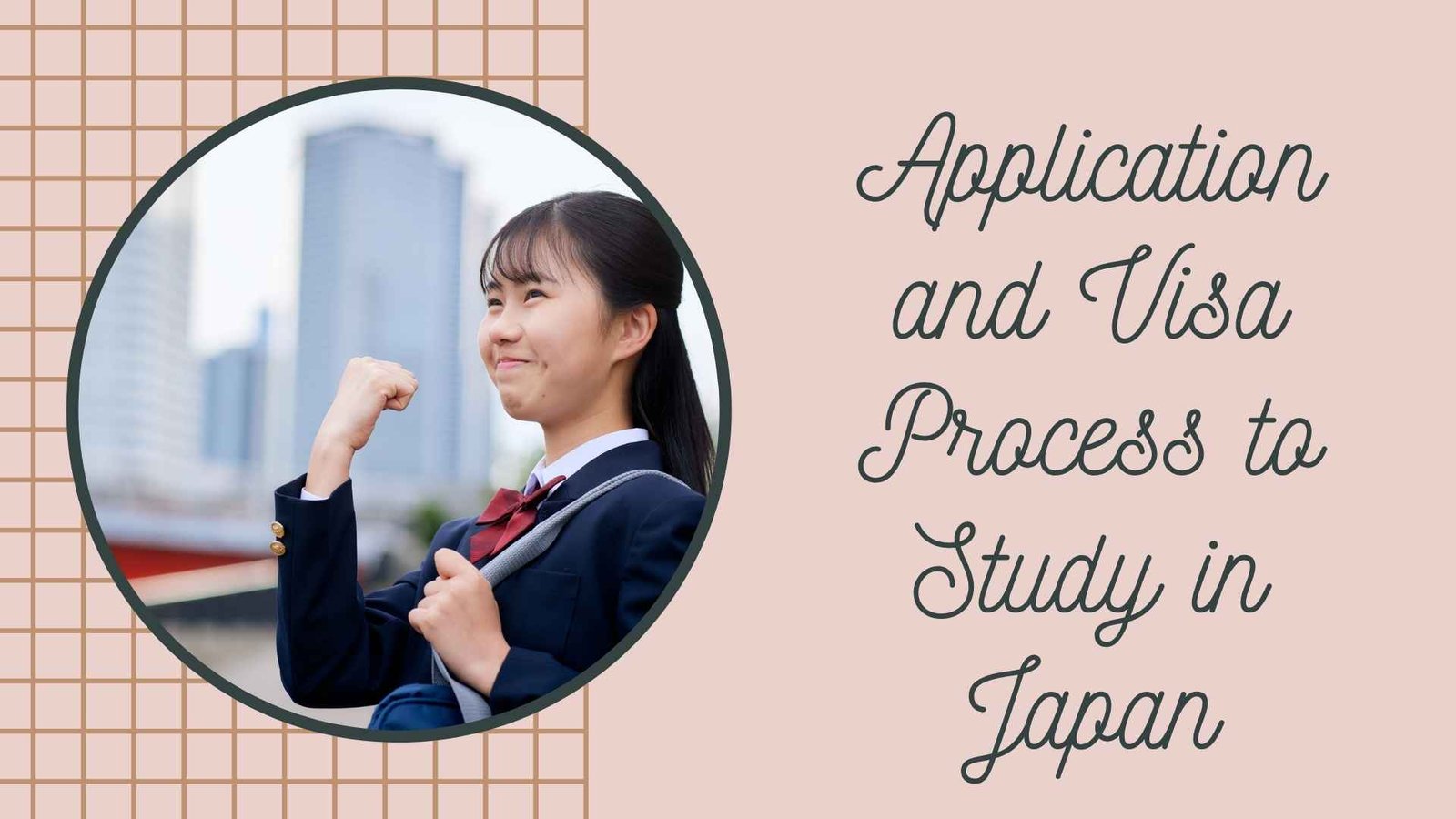Application and Visa Process to Study in Japan Japan has emerged as a top destination for Indian students seeking quality education, cultural experiences, and global career opportunities. From world-class universities and cutting-edge technology to rich traditions and vibrant student life, Japan offers a life-changing educational journey. However, navigating the application and visa process can be challenging without proper guidance.
This comprehensive guide walks you through every step of studying in Japan, including eligibility, required documents, the Certificate of Eligibility (COE), student visa process, costs, and tips to ensure a smooth transition.
For professional guidance, check out TLS – The Japanese Language School, which offers end-to-end support for Indian students.
Why Study in Japan?
Japan combines academic excellence, cultural richness, and career opportunities, making it an ideal study destination: Visa Process

- World-Class Education: Japanese universities are recognized globally, particularly for engineering, technology, business, and Japanese language programs.
- Affordable Tuition: Tuition fees in Japan are more budget-friendly compared to countries like the USA or UK without compromising on quality.
- Cultural Immersion: Students can experience Japanese festivals, tea ceremonies, traditional arts, and daily life alongside academic studies.
- Global Career Opportunities: Universities collaborate with industry leaders, giving students internships, practical experience, and pathways to global careers.
Studying in Japan is not just an academic pursuit—it’s a holistic experience that equips students with international exposure, cultural understanding, and professional skills.
Step-by-Step Guide: How Indian Students Can Study in Japan
Indian students can study in Japan by following a structured process: first, choose a university and course aligned with career goals; next, meet eligibility criteria and prepare required documents; then, apply to the university and obtain the Certificate of Eligibility (COE); finally, submit a student visa application for a smooth transition to Japan. 100% Scholarships to Study Abroad

1. Choose Your University and Course
Research universities and programs that match your career goals. Japan offers a variety of courses, including:
- Engineering & Technology
- Computer Science & IT
- Business Management & Economics
- Japanese Language & Culture
Consider factors such as location, curriculum, faculty expertise, industry connections, and scholarship opportunities. Language and Culture Support
2. Meet the Eligibility Criteria
Different programs have specific requirements, but generally:
- Undergraduate Programs: Completion of 12th grade or equivalent.
- Postgraduate Programs: A bachelor’s degree in a relevant field.
- Language Proficiency: JLPT (Japanese Language Proficiency Test) levels may be required depending on the course. Some programs may also accept English proficiency tests like TOEFL or IELTS.
3. Prepare Required Documents
Successful applications depend on proper documentation. Essential documents include:
- Academic transcripts and certificates
- Valid passport copy
- Statement of Purpose (SOP)
- Letters of recommendation
- Language proficiency scores (JLPT/TOEFL/IELTS)
4. Apply to Universities
Most universities allow online applications. Submit all required documents before the deadline. Be prepared for: Japan Scholarships for Indian Students
- Interviews (online or in-person)
- Additional document requests
- Scholarship or financial aid submissions
5. Receive the Certificate of Eligibility (COE)
Once admitted, the university issues the COE, confirming your eligibility for a Japanese student visa. The COE is crucial for the visa application and proves that you meet all legal and admission requirements.
Japan Student Visa Application Process
Once you receive the Certificate of Eligibility (COE) from your Japanese university, you can proceed to apply for a student visa. Follow a detailed step-by-step process, including completing the visa application form, preparing all required documents, submitting them to the embassy, paying fees, and waiting for processing. Exams/Stream
Step 1: Complete the Visa Application Form
Download the Japanese student visa application form from the embassy website and carefully fill in all personal, academic, and contact details.
- Download the form from the Japanese embassy website in India.
- Fill in all personal, academic, and contact details accurately.
Step 2: Prepare Required Documents
To apply for a Japanese student visa, gather all essential documents, including a valid passport, recent passport-size photographs, Certificate of Eligibility (COE), admission letter, financial proof, academic transcripts, language proficiency scores, health certificates if required, and a completed visa application form. SSW Visa Japan Age Limit
- Valid passport
- Recent passport-size photographs
- Certificate of Eligibility (COE)
- Admission letter from a Japanese university
- Financial proof (bank statements, scholarship letters)
- Health certificates (if required)
Step 3: Submit Application
Submit your completed Japanese student visa application, along with all required supporting documents, to the Japanese embassy or consulate in India to initiate the processing.
Step 4: Pay the Visa Fee
The Japanese student visa fee ranges from 3,000–6,000 INR. Additional costs may include document attestation, translations, and travel expenses for a smooth application.
- Student visa fee: 3,000–6,000 INR
- Additional costs: Document attestation, translation, and travel expenses
Step 5: Wait for Processing
Japanese student visa processing usually takes 5–7 working days. Complex cases or incomplete documents may extend processing to 2–4 weeks.
- Standard processing: 5–7 working days
- Complex or incomplete cases: 2–4 weeks
Note: Japan does not offer visa on arrival for Indian citizens.
Japan Student Visa: Important Details
Indian students applying for a Japanese student visa need a valid COE, admission letter, financial proof (5–10 lakh INR), passport, photos, and completed application form. Processing takes 5–7 working days, with part-time work allowed (28 hours/week). No strict age limit exists, and visas must be obtained before travel, as Japan does not offer visa on arrival. Language and Culture Support
Minimum Bank Balance
Students must show financial proof covering tuition and living expenses:
- Recommended: 5,00,000–10,00,000 INR for one year
Age Limit
No strict age limit:
- Undergraduate: 18–25 years (ideal)
- Postgraduate: 22–35 years (ideal)
- Applicants outside these ranges may still be considered based on merit
Living Costs
Students in Japan typically spend 80,000–150,000 JPY monthly on accommodation, food, transportation, and personal expenses. Costs vary by city, lifestyle, and housing choice.
- Average monthly expenses: 80,000–150,000 JPY
- Includes accommodation, food, transportation, and personal expenses
Work While Studying
International students in Japan can work part-time up to 28 hours per week during semesters and full-time during vacations with a permit.
- Part-time work allowed: Up to 28 hours/week during semesters
- Full-time work allowed during vacations
TLS – The Japanese Language School: Student Visa Assistance
TLS – The Japanese Language School provides comprehensive support for Indian students planning to study in Japan. Services include document preparation, financial guidance, COE submission, student visa application assistance, embassy coordination, and pre-departure briefings. With TLS, students can navigate the entire visa process smoothly, ensuring a stress-free and successful journey to Japan.
- Document Preparation & Financial Guidance: Organize COE, admission letters, and bank proofs.
- Application Assistance: Step-by-step support to complete the student visa application accurately.
- Embassy Coordination: Help with COE submission and embassy appointments.
- Pre-Departure Briefings: Cultural orientation and practical tips for life in Japan.
Contact TLS:
Address: 2/81-82, 2nd Floor, Lalita Park, Gali No – 2, Laxmi Nagar, New Delhi – 110092
Call: +91 8700956038
Email: tls@teamlanguages.com
FAQs About Studying in Japan
- How can Indian students study in Japan?
Indian students can study in Japan by following a structured process: choose a university that aligns with your career goals, meet the program eligibility requirements, apply for a Certificate of Eligibility (COE) through the university, and finally submit your student visa application to the Japanese embassy or consulate. Planning in advance ensures a smooth journey. - How much does a student visa cost?
The student visa fee ranges from 3,000–6,000 INR, depending on the embassy or consulate. Additional costs may include document attestation, translations, travel, and other processing fees. Budgeting in advance is essential for a stress-free application. - What is the minimum bank balance required for a Japanese student visa?
Indian students are required to demonstrate financial stability to cover tuition and living expenses for at least one year. Typically, a bank balance of 5–10 lakh INR is recommended. Scholarships or financial aid can also support this requirement. - What documents are required for a student visa?
Essential documents include:- Passport valid for at least 6 months
- Certificate of Eligibility (COE)
- Admission letter from a Japanese university
- Proof of financial resources (bank statements, scholarships)
- Completed visa application form
- Passport-size photographs
- Academic transcripts and certificates
- Statement of Purpose (SOP)
- Language proficiency certificates (JLPT, TOEFL, IELTS if applicable)
- Is there an age limit for a student visa in Japan?
Japan does not have a strict age limit for student visas. The ideal age range is 18–25 years for undergraduate programs and 22–35 years for postgraduate programs. Applications outside this range may still be accepted based on academic merit and professional experience. JLPT N4 Syllabus - How long does it take to process a student visa?
Standard processing usually takes 5–7 working days, while complex cases or applications with missing documents may take 2–4 weeks. Early application, ideally 3 months before the course start, is recommended to avoid delays. - Can I get a Japanese visa on arrival as an Indian citizen?
No. Japan does not offer visa on arrival for Indian citizens. All travelers, including students, must obtain a visa before entering Japan. - Can I work while studying in Japan?
Yes, international students can work part-time up to 28 hours per week during semesters and full-time during vacations, provided they obtain a work permit from Japanese immigration authorities. This allows students to support living expenses and gain practical experience. - Does TLS help with visa applications?
Absolutely. TLS – The Japanese Language School provides end-to-end support, including document verification, COE submission, embassy coordination, and pre-departure guidance. - What is the Certificate of Eligibility (COE)?
COE is an official document issued by the Japanese Immigration Bureau through your university, confirming that you meet all admission and immigration requirements. It is mandatory to apply for a student visa. - Which Japanese universities are best for Indian students?
Some of the top universities include:- University of Tokyo
- Kyoto University
- Osaka University
- Waseda University
- Sophia University
- Keio University
- Do I need to know Japanese to study in Japan?
It depends on your program. Some courses are taught in English, while others require Japanese proficiency (JLPT N5–N2). Learning basic Japanese helps with daily life and cultural immersion. - Can I study in Japan without JLPT?
Yes, if your course is taught in English or if the university accepts English proficiency tests such as TOEFL or IELTS. - How do I apply for the COE?
The university applies for the COE on your behalf. You need to submit all necessary documents, including academic transcripts, passport copy, financial proof, and application forms. Once issued, the COE allows you to apply for a student visa. - What is the average living cost in Japan?
Students can expect to spend 80,000–150,000 JPY per month, covering accommodation, food, transportation, and personal expenses. Costs vary depending on city and lifestyle. - Can I get a scholarship to study in Japan?
Yes. Scholarships include:- MEXT Scholarship (Government of Japan)
- JASSO Scholarship
- University-specific financial aid
Scholarships help cover tuition, accommodation, and living expenses.
- When should I apply for a student visa?
Submit your visa application at least 3 months before your course starts. Early application ensures ample processing time and reduces stress before departure. - Do I need health insurance in Japan?
Yes, all international students must enroll in Japan’s National Health Insurance (NHI), which covers medical treatment at a low cost. - Can I extend my student visa in Japan?
Yes, students can apply for an extension at the local immigration office before their current visa expires. Extensions depend on academic progress and university confirmation. - How long is a Japanese student visa valid?
Typically, the student visa is valid for 1 year, but it can be renewed according to course duration and academic performance. - Can I switch universities after getting a student visa?
Yes, but you must inform the immigration office and update your COE accordingly. Approval is required before transferring to a new university. - Is accommodation provided by universities?
Many universities offer student dormitories or on-campus housing. Private apartments are also available, often at a higher cost. - Do I need a return ticket to get a student visa?
Not always, but some embassies may request proof of onward travel or sufficient funds for return as part of financial assessment. - Can I travel to other countries while on a student visa in Japan?
Yes, international students can travel outside Japan. For long trips, you may need a re-entry permit to maintain valid student visa status. - What support does TLS provide after arrival in Japan?
TLS offers ongoing support including:- Cultural orientation and pre-departure briefings
- Guidance for part-time work permits
- Accommodation assistance
- Academic and lifestyle support to ensure smooth adjustment
Conclusion
Studying in Japan is a rewarding experience that combines academic excellence, cultural immersion, and global career opportunities. While the application and student visa process may seem complex, careful planning, thorough documentation, and professional guidance can make it smooth and stress-free.
With resources like TLS – The Japanese Language School, Indian students can confidently navigate the entire journey—from university applications to securing a student visa—ensuring a successful and enriching academic experience in Japan.
Start planning early, prepare your documents meticulously, and embrace the adventure of studying in one of the most innovative and culturally rich countries in the world. Your dream of studying in Japan is within reach!


COMMENTS